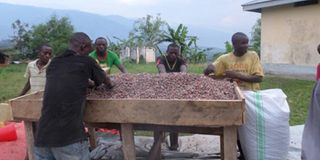Create markets for our products - farmers tell government

Cocoa farmers will gain more from locally made cocoa products than exports of the pods and beans. File photo
Farmers have tasked government to set up markets for their produce to ensure better prices by dealing directly with the buyers.
The call was made during a National Farmers’ Summit, which was held in Bwebajja, near Kampala, under the theme: “Towards a united farmers’ front for socio-economic transformation in Uganda”.
Many farmers challenged government that their produce is bought at a cheaper price yet agriculture contributes significantly towards development.
Stakeholders
Jimmy Besigye, from Kabaale District Farmers’ Association, pointed out that farmers are left out while making decisions on agriculture.
He argued that this limits their bargaining power.
“Government must listen to farmers and take their suggestions, they are stakeholders. Farmers toil a lot but it’s the businessmen who benefit,” he said.
“For instance, a farmer will sell maize to the businessman, who will pay a lower price and in turn sell at a much higher price. This is why we call upon government to intervene and save farmers.”
In addition to that there is no community participation when it comes to agricultural programmes, noted Elizabeth Nsimadale, the chief executive officer Uganda Cooperative Support Services Union. “Farmers must be involved in decision making. This will definitely motivate them to work hard.”
Growth
However, Tress Buchanayandi, the minister of Agriculture, Animal Industry and Fisheries (Maaif), told the meeting that farmers are being trained on better farming methods under the Operation Wealth Creation and Naads programmes. Through these, seeds and equipment will be availed, he added.
“Farmers have registered some growth and this is crucial. In fact, they have raised the GDP [Gross Domestic Product] from 21 per cent to 26 per cent. Government will not therefore neglect them because they matter a lot. The process of having markets for their output is under way.”
Sustainable
Commenting on the role of farmers’ groups, Bob Barigye, the assistant commissioner, cooperative and policy, Maaif, said that there are several challenges hindering them and that this has left many lagging behind.
Some of these challenges are: Lack of funds, lack of cohesiveness, difficulty in recovery of benefits, ignorance and selfishness among farmers among others. Therefore, for farmer groups to be sustainable, they should have a clear purpose, inclusive leadership and a strong membership.




